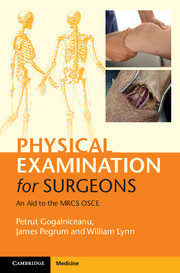Book contents
- Frontmatter
- Dedication
- Contents
- List of contributors
- Introduction
- Acknowledgments
- List of abbreviations
- Section 1 Principles of surgery
- Section 2 General surgery
- Section 3 Breast surgery
- Section 4 Pelvis and perineum
- Section 5 Orthopaedic surgery
- Section 6 Vascular surgery
- Section 7 Heart and thorax
- Section 8 Head and neck surgery
- Section 9 Neurosurgery
- Section 10 Plastic surgery
- Section 11 Surgical radiology
- Section 12 Airway, trauma and critical care
- Index
Introduction
Published online by Cambridge University Press: 05 July 2015
- Frontmatter
- Dedication
- Contents
- List of contributors
- Introduction
- Acknowledgments
- List of abbreviations
- Section 1 Principles of surgery
- Section 2 General surgery
- Section 3 Breast surgery
- Section 4 Pelvis and perineum
- Section 5 Orthopaedic surgery
- Section 6 Vascular surgery
- Section 7 Heart and thorax
- Section 8 Head and neck surgery
- Section 9 Neurosurgery
- Section 10 Plastic surgery
- Section 11 Surgical radiology
- Section 12 Airway, trauma and critical care
- Index
Summary
The Intercollegiate Membership of the Royal College of Surgeons (MRCS) examination aims to assess a junior doctor's competence to enter surgical training. This is based on the candidate's understanding of core clinical and professional principles needed to diagnose and treat surgical disease. The exam is the first step in a process that transforms a doctor into a surgeon and provides a common foundation of practice for all surgeons in the UK, irrespective of their subspecialty.
Focused, systematic and diagnostic physical examination skills are a key aspect of surgical practice. Their purpose is to assess anatomical form and test physiological function
in order to allow a professional opinion to be formulated.
The book provides one method of performing physical examination from a surgeon's perspective, addressing key topics in the objective structured clinical examination (OSCE) part of the assessment. It also addresses related diagnostic skills, such as history taking, communication, critical care assessment and interpretation of surgical radiology images.
It aims to be a practical manual, being neither exhaustive nor specific to a single syllabus. It includes chapters on topics such as gynaecology and neurosurgery, which, although not tested in the MRCS exam, may be relevant to the practice of general surgery.
We recommend the consultation of reference manuals for the acquisition of finer details and clinical knowledge. Updated details of the MRCS examination format, syllabus and
requirements must be obtained from the relevant examining bodies.
Each chapter contains the following key elements:
At-a-glance checklists on how to perform any physical examination routine.
Examination notes, including focused questions and answers.
Mind maps of differential diagnoses, to facilitate the easy formulation and recall of diagnoses.
Tips, mnemonics and examples.
We hope this book will be of use in caring for your patients.
- Type
- Chapter
- Information
- Physical Examination for SurgeonsAn Aid to the MRCS OSCE, pp. xvPublisher: Cambridge University PressPrint publication year: 2015

